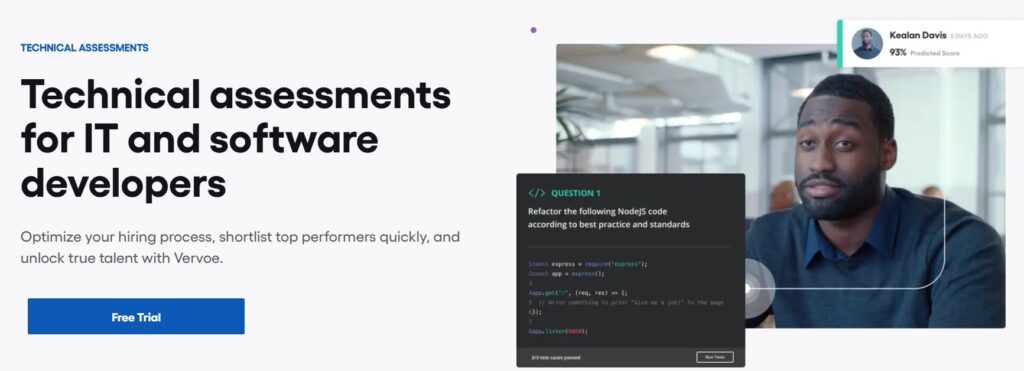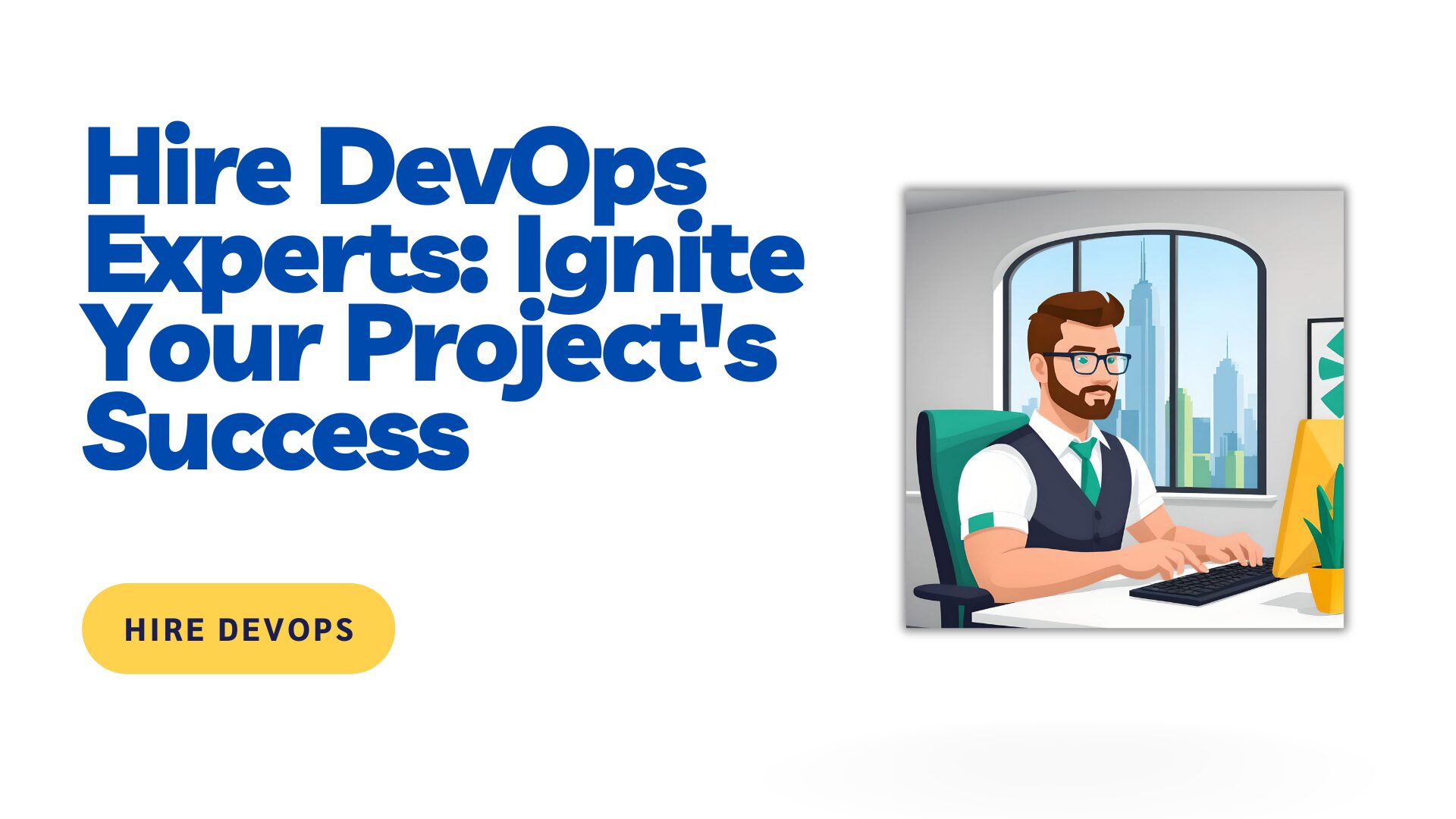In today’s transformation landscape, businesses are constantly seeking ways to streamline their operations and boost efficiency. Enter the DevOps Engineer – a crucial player in the modern tech world. But what exactly does a DevOps engineer do, and why should you consider hiring one for your team?
As companies strive to deliver software faster and more reliably, the role of a DevOps Engineer has become increasingly essential. These professionals bridge the gap between development and operations, fostering a culture of collaboration and continuous improvement. Are you struggling with slow deployment cycles, frequent system failures, or a lack of communication between your tech teams? A skilled DevOps Engineer could be the solution you’ve been searching for.
In this blog post, we’ll explore the world of DevOps engineering, from understanding the role to identifying how to hire a DevOps Engineer for your organization. We’ll guide you through the hiring process, share tips on onboarding and integration, and reveal strategies for retaining top DevOps talent. Whether you’re a startup looking to scale or an established enterprise aiming to stay competitive, buckle up as we dive into the transformative power of hiring a DevOps Engineer.
Understanding the Role of a DevOps Engineer
Key responsibilities and skills
A DevOps Engineer plays a crucial role in bridging the gap between development and operations teams. Their primary responsibilities include:
- Integrating development and operations processes
- Managing IT infrastructure
- Ensuring smooth code deployment
- Enhancing operational efficiency
To excel in this role, DevOps engineers must possess a diverse skill set:
| Skill Category | Essential Skills |
|---|---|
| Programming | Proficiency in languages like Ruby and Python |
| Systems | Familiarity with Linux-based systems |
| Cloud Technologies | Experience with various automation and cloud platforms |
| Tools | Expertise in Git, Jenkins, Docker, and Kubernetes |
Importance in modern software development
DevOps Engineers are increasingly vital in today’s fast-paced software development landscape. Their importance stems from:
- Facilitating continuous integration and deployment (CI/CD)
- Streamlining the entire software development lifecycle
- Promoting collaboration between traditionally siloed teams
- Enhancing the quality and speed of software delivery
- Implementing process automation to improve efficiency
How DevOps engineers bridge development and operations
DevOps Engineers serve as the linchpin between development and IT operations teams, fostering a culture of collaboration and shared responsibility. They achieve this by:
- Implementing DevOps practices and principles across the organization
- Automating deployment and integration processes
- Managing version control and configuration management
- Ensuring security throughout the software lifecycle
- Optimizing release cycles and enhancing overall efficiency
By integrating these teams and implementing DevOps practices, organizations can achieve faster feedback loops, higher-quality software, and more responsive development processes.
With this understanding of the DevOps Engineer’s role, we can now explore the numerous benefits of hiring a DevOps Engineer for your organization. In the next section, we’ll dive into how these professionals can drive innovation, improve productivity, and contribute to your company’s success.
Benefits of Hiring a DevOps Engineer
Now that we have covered the role of a DevOps Engineer, let’s explore the numerous advantages of bringing one onto your team. Building on the understanding of their responsibilities, we can see how these professionals contribute significantly to an organization’s success.
Improved collaboration and communication
DevOps Engineers serve as a bridge between development and operations teams, fostering a culture of open communication and shared responsibilities. This collaborative approach leads to:
- Faster issue resolution
- Streamlined workflows
- Enhanced teamwork across departments
Faster software delivery and deployment
By implementing Continuous Integration and Continuous Deployment (CI/CD) practices, DevOps engineers significantly accelerate the software development lifecycle:
| Benefits of CI/CD | Impact |
|---|---|
| Frequent updates | Improved customer satisfaction |
| Rapid feedback | Quick product refinements |
| Automated testing | Ensured reliability before deployment |
Enhanced system reliability and stability
DevOps Engineers contribute to system stability through:
- Robust monitoring and feedback loops
- Proactive issue identification and resolution
- Incremental changes that minimize risks
These practices result in more reliable software and infrastructure, reducing downtime and improving overall system performance.
Cost reduction through automation
DevOps engineers leverage automation to streamline processes and reduce costs:
- Infrastructure as Code (IaC) for consistent environment management
- Automated testing to catch issues early in the development cycle
- Efficient resource allocation through cloud technologies
By automating repetitive tasks, DevOps Engineers free up time for innovation and value-added activities, ultimately leading to cost savings and improved productivity.
With these benefits in mind, next, we’ll see how to identify the right DevOps Engineer for your team. Understanding the advantages of hiring a DevOps professional sets the stage for determining the specific skills and qualities you should look for in potential candidates.
Identifying the Right DevOps Engineer for Your Team
Now that we’ve explored the benefits of hiring a DevOps Engineer, let’s focus on identifying the right candidate for your team. Finding the perfect fit requires a careful assessment of both technical and soft skills, as well as experience with relevant tools and technologies.
Identifying the Right DevOps Engineer for Your Team
A. Essential technical skills to look for
When evaluating potential DevOps Engineers, consider the following technical skills:
- Proficiency in Linux-based systems
- Expertise in programming languages (e.g., Python, Ruby, Java)
- Experience with automation tools and cloud services
- Knowledge of OS administration
- Familiarity with CI/CD pipelines
A strong DevOps Engineer should demonstrate a comprehensive understanding of the software development lifecycle and configuration management.
B. Soft skills and cultural fit
While technical skills are crucial, soft skills and cultural fit are equally important for a DevOps Engineer to thrive in your team:
- Strong communication skills
- Collaborative mindset
- Proactive approach to problem-solving
- Customer-focused attitude
- Openness to change and adaptability
These attributes ensure that the DevOps Engineer can effectively bridge the gap between development and operations teams, fostering a culture of collaboration and continuous improvement.
C. Experience with relevant tools and technologies
A competent DevOps Engineer should be well-versed in various tools and technologies essential to the role:
| Category | Tools |
|---|---|
| Version Control | Git |
| CI/CD | Jenkins |
| Containerization | Docker |
| Orchestration | Kubernetes |
| Cloud Platforms | AWS, Azure, or GCP |
| Monitoring | Prometheus, ELK stack |
Familiarity with these tools enables the DevOps Engineer to streamline processes, automate workflows, and maintain application stability.
D. Problem-solving and adaptability
Look for candidates who demonstrate:
- A commitment to continuous learning and improvement
- The ability to adapt to new technologies and methodologies
- Strong analytical and problem-solving skills
- Experience in managing IT infrastructure and overseeing testing
- A proactive approach to identifying and resolving issues
DevOps Engineers should be capable of navigating complex technical challenges while maintaining a focus on business objectives and efficiency.
With these key attributes in mind, you’ll be better equipped to identify the right DevOps Engineer for your team. In the next section, we’ll dive into the hiring process, exploring effective strategies to attract and evaluate top DevOps talent.
The Hiring Process
Now that we’ve identified the right DevOps Engineer for your team, it’s time to dig into the hiring process. This crucial step ensures you attract and select the best talent for your organization.
A. Crafting an effective job description
To begin, collaborate with the hiring manager to develop a clear understanding of the DevOps role and its responsibilities. Create a well-crafted DevOps job description that emphasizes the necessary skills for success, including:
- Core competencies: coding, scripting, networking, infrastructure as code
- CI/CD expertise
- Version control systems proficiency
- Containerization knowledge
- Monitoring and logging skills
- Cloud services familiarity
- Security practices
B. Screening resumes and portfolios
When evaluating applicants, consider using a skills assessment tool like Vervoe to efficiently identify top candidates. This approach allows you to:
- Select from an expert library of assessments
- Tailor the assessment to your organization’s needs
- Pinpoint candidates who meet or exceed established criteria

C. Conducting technical interviews and assessments
Structure your interview process into phases for comprehensive evaluation:
- Initial Screen (30 minutes)
- Discuss background and technical skills
- Assess DevOps philosophy
- Provide company overview
- Detailed Video Interview (1 hour)
- Evaluate technical and social skills
- Emphasize communication abilities
- Technical Screen (30-60 minutes)
- Assess comfort with delivery pipeline (for Consultants)
- Evaluate knowledge of DevOps tools (for Technical positions)
| Interview Phase | Duration | Focus Areas |
|---|---|---|
| Initial Screen | 30 minutes | Background, skills, philosophy |
| Detailed Video Interview | 1 hour | Technical and social skills |
| Technical Screen | 30-60 minutes | Specific role requirements |
D. Evaluating cultural fit
During the interview process, pay attention to:
- Problem-solving and adaptability
- Initiative and ownership
- Effective communication and collaboration skills
- Interdisciplinary expertise
- Understanding of DevOps principles
Use behavioral and situational interview questions to assess these qualities effectively.
With the hiring process complete, we’ll next explore the crucial steps of onboarding and integrating your new DevOps Engineer into your team, ensuring a smooth transition and maximizing their potential contribution to your organization.
Onboarding and Integration
Now that we’ve covered the hiring process, it’s crucial to focus on effectively onboarding and integrating your new DevOps Engineer into your team. A smooth transition ensures that your new hire can quickly contribute to your organization’s goals and foster a collaborative environment.
Setting clear expectations and goals
When onboarding a new DevOps Engineer, it’s essential to establish clear expectations and goals from the outset. This alignment helps the new hire understand their role within the larger context of your DevOps initiatives. Consider the following:
- Define specific objectives for the first 30, 60, and 90 days
- Outline key performance indicators (KPIs) related to DevOps practices
- Discuss how their work contributes to the organization’s overall DevOps strategy
Introducing the new hire to existing workflows
To ensure a seamless integration, familiarize your new DevOps Engineer with your current workflows and processes. This step is crucial for maintaining consistency and efficiency across your development and operations teams.
| Workflow Aspect | Introduction Method |
|---|---|
| CI/CD Pipelines | Walkthrough of existing pipelines and tools (e.g., Jenkins) |
| Version Control | Overview of Git practices and repository structure |
| Infrastructure Management | Introduction to IaC tools (e.g., Ansible, Terraform) |
| Monitoring and Logging | Demonstration of current observability practices |
Providing necessary resources and tools
Equip your new DevOps Engineer with the resources and tools they need to succeed in their role. This may include:
- Access to relevant development and operations platforms
- Documentation on internal processes and best practices
- Training materials for specific tools used in your DevOps ecosystem
- Information on security protocols and compliance requirements
Fostering collaboration with other team members
Encourage collaboration between your new DevOps Engineer and existing team members to break down silos and promote a culture of teamwork. Consider implementing the following:
- Pair programming sessions with developers
- Cross-functional team meetings to discuss ongoing projects
- Regular retrospectives to gather feedback and improve processes
- Team-building activities to strengthen relationships
By focusing on these key aspects of onboarding and integration, you’ll set your new DevOps Engineer up for success and contribute to the overall effectiveness of your DevOps team. With this solid foundation in place, we’ll next explore strategies for retaining top DevOps talent and ensuring long-term success for your organization.

Retaining Top DevOps Talent
Now that we have covered the onboarding and integration process for DevOps Engineers, it’s crucial to focus on retaining these valuable team members. With the high demand for DevOps expertise, organizations must implement strategies to keep their top talent engaged and committed. Let’s explore key approaches to ensure long-term retention of DevOps Engineers.
A. Offering competitive compensation and benefits
To retain top DevOps talent, it’s essential to provide a compensation package that reflects their specific skills and experience. Unlike relying on general industry averages, tailor your offers to the individual’s expertise. Consider the following:
- Conduct regular salary reviews
- Offer performance-based bonuses
- Provide comprehensive health and wellness benefits
- Implement flexible work arrangements
B. Providing opportunities for growth and learning
DevOps Engineers thrive on continuous learning and skill development. To keep them engaged, organizations should:
- Support ongoing training and certifications
- Encourage attendance at industry events and conferences
- Facilitate internal knowledge-sharing sessions
- Provide access to online learning platforms
| Growth Opportunity | Benefits |
|---|---|
| Certifications | Enhanced expertise, industry recognition |
| Industry events | Networking, exposure to new technologies |
| Internal workshops | Knowledge sharing, team collaboration |
| Online courses | Flexible learning, diverse skill acquisition |
C. Creating a positive work environment
A supportive work culture is crucial for retaining DevOps talent. Implement the following strategies:
- Foster open communication through regular feedback sessions
- Encourage collaboration between teams
- Promote work-life balance
- Create pathways for career advancement
D. Recognizing and rewarding contributions
Acknowledging the efforts and achievements of DevOps Engineers can significantly boost morale and job satisfaction. Consider these approaches:
- Implement a peer recognition program
- Celebrate team successes and milestones
- Offer performance-based incentives
- Provide opportunities for increased responsibility and leadership roles
By focusing on these key areas, organizations can create an environment that not only attracts top DevOps talent but also encourages long-term commitment and growth. Remember, retaining skilled DevOps Engineers is crucial for maintaining a competitive edge in today’s fast-paced technological landscape.
Need to Hire DevOps Engineer Talent?
Don’t let your development pipeline slow you down. Nexus IT Group connects you with top-tier DevOps talent to revolutionize your software delivery process. Our expert DevOps recruiters understand the unique challenges of DevOps and will match you with skilled professionals who can:
• Streamline your CI/CD pipelines
• Optimize cloud infrastructure
• Implement cutting-edge automation
• Enhance system reliability and scalability
Take the first step towards DevOps excellence. Contact Nexus IT Group now to hire a DevOps engineer who will transform your development workflow and drive your business forward.
Ready to accelerate your DevOps journey? Call us at (913) 815-1750 or visit contact us directly to start hiring!
Conclusion
Hiring a DevOps Engineer is a strategic decision that can significantly impact your organization’s efficiency, productivity, and overall success. By understanding the role, benefits, and process of bringing a DevOps professional on board, you’re taking a crucial step towards streamlining your development and operations processes.
Remember, the right DevOps Engineer can be a game-changer for your team. Take the time to identify the perfect fit, implement a thorough hiring process, and invest in proper onboarding and integration. By fostering a culture that values DevOps principles and retaining top talent, you’ll position your organization for long-term success in today’s fast-paced, technology-driven landscape.
